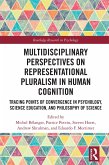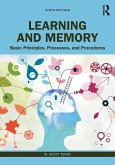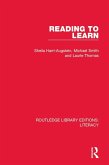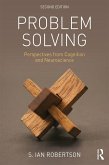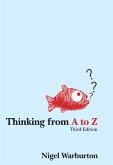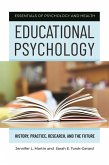Multidisciplinary Perspectives on Representational Pluralism in Human Cognition (eBook, ePUB)
Tracing Points of Convergence in Psychology, Science Education, and Philosophy of Science
Redaktion: Bélanger, Michel; Mortimer, Eduardo F.; Shtulman, Andrew; Horst, Steven; Potvin, Patrice
42,95 €
42,95 €
inkl. MwSt.
Sofort per Download lieferbar

21 °P sammeln
42,95 €
Als Download kaufen

42,95 €
inkl. MwSt.
Sofort per Download lieferbar

21 °P sammeln
Jetzt verschenken
Alle Infos zum eBook verschenken
42,95 €
inkl. MwSt.
Sofort per Download lieferbar
Alle Infos zum eBook verschenken

21 °P sammeln
Multidisciplinary Perspectives on Representational Pluralism in Human Cognition (eBook, ePUB)
Tracing Points of Convergence in Psychology, Science Education, and Philosophy of Science
Redaktion: Bélanger, Michel; Mortimer, Eduardo F.; Shtulman, Andrew; Horst, Steven; Potvin, Patrice
- Format: ePub
- Merkliste
- Auf die Merkliste
- Bewerten Bewerten
- Teilen
- Produkt teilen
- Produkterinnerung
- Produkterinnerung

Bitte loggen Sie sich zunächst in Ihr Kundenkonto ein oder registrieren Sie sich bei
bücher.de, um das eBook-Abo tolino select nutzen zu können.
Hier können Sie sich einloggen
Hier können Sie sich einloggen
Sie sind bereits eingeloggt. Klicken Sie auf 2. tolino select Abo, um fortzufahren.

Bitte loggen Sie sich zunächst in Ihr Kundenkonto ein oder registrieren Sie sich bei bücher.de, um das eBook-Abo tolino select nutzen zu können.
Bringing together diverse theoretical and empirical contributions from the fields of social and cognitive psychology, philosophy, and science education, this volume explores representational pluralism as a phenomenon characteristic of human cognition.
- Geräte: eReader
- mit Kopierschutz
- eBook Hilfe
Andere Kunden interessierten sich auch für
![Multidisciplinary Perspectives on Representational Pluralism in Human Cognition (eBook, PDF) Multidisciplinary Perspectives on Representational Pluralism in Human Cognition (eBook, PDF)]() Multidisciplinary Perspectives on Representational Pluralism in Human Cognition (eBook, PDF)42,95 €
Multidisciplinary Perspectives on Representational Pluralism in Human Cognition (eBook, PDF)42,95 €![The Greatest Adventures In Human Development (eBook, ePUB) The Greatest Adventures In Human Development (eBook, ePUB)]() G. Kenneth WestThe Greatest Adventures In Human Development (eBook, ePUB)115,95 €
G. Kenneth WestThe Greatest Adventures In Human Development (eBook, ePUB)115,95 €![Learning and Memory (eBook, ePUB) Learning and Memory (eBook, ePUB)]() W. Scott TerryLearning and Memory (eBook, ePUB)162,95 €
W. Scott TerryLearning and Memory (eBook, ePUB)162,95 €![Reading to Learn (eBook, ePUB) Reading to Learn (eBook, ePUB)]() Sheila Harri-AugsteinReading to Learn (eBook, ePUB)33,95 €
Sheila Harri-AugsteinReading to Learn (eBook, ePUB)33,95 €![Problem Solving (eBook, ePUB) Problem Solving (eBook, ePUB)]() S. Ian RobertsonProblem Solving (eBook, ePUB)50,95 €
S. Ian RobertsonProblem Solving (eBook, ePUB)50,95 €![Thinking from A to Z (eBook, ePUB) Thinking from A to Z (eBook, ePUB)]() Nigel WarburtonThinking from A to Z (eBook, ePUB)21,95 €
Nigel WarburtonThinking from A to Z (eBook, ePUB)21,95 €![Educational Psychology (eBook, ePUB) Educational Psychology (eBook, ePUB)]() Jennifer L. MartinEducational Psychology (eBook, ePUB)50,95 €
Jennifer L. MartinEducational Psychology (eBook, ePUB)50,95 €-
-
-
Bringing together diverse theoretical and empirical contributions from the fields of social and cognitive psychology, philosophy, and science education, this volume explores representational pluralism as a phenomenon characteristic of human cognition.
Dieser Download kann aus rechtlichen Gründen nur mit Rechnungsadresse in A, B, BG, CY, CZ, D, DK, EW, E, FIN, F, GR, HR, H, IRL, I, LT, L, LR, M, NL, PL, P, R, S, SLO, SK ausgeliefert werden.
Produktdetails
- Produktdetails
- Verlag: Taylor & Francis eBooks
- Seitenzahl: 326
- Erscheinungstermin: 18. Juli 2022
- Englisch
- ISBN-13: 9781000617924
- Artikelnr.: 64096826
- Verlag: Taylor & Francis eBooks
- Seitenzahl: 326
- Erscheinungstermin: 18. Juli 2022
- Englisch
- ISBN-13: 9781000617924
- Artikelnr.: 64096826
- Herstellerkennzeichnung Die Herstellerinformationen sind derzeit nicht verfügbar.
Michel Bélanger is Professor of Science Education, University of Québec at Rimouski, Canada. Patrice Potvin is Professor of Science Education, University of Québec at Montréal, Canada. Steven Horst is Professor of Philosophy at Wesleyan University, Middletown, CT, USA. Andrew Shtulman is Professor in the Departments of Psychology & Cognitive Science, Occidental College, USA. Eduardo Mortimer is Professor of Science Education, Federal University of Minas Gerai, Brazil.
Section 1: Introduction 1. Introduction to representational pluralism 2.
Bridging pluralisms Section 2: Psychology 3. Satisfying epistemic and
existential needs: Representational pluralism across scientific domains 4.
Computational modeling of representational pluralism in explanations 5.
Representational pluralism in the service of learning: The case of thought
experiments 6. Navigating the conflict between science and intuition
Section 3: Science education 7. From conceptual change to conceptual
prevalence: What the acknowledgement of representational plurality could
mean for science teaching 8. Examining evidence for the effects and
antecedents of plurality in revising science misconceptions 9.
Heterogeneity and pluralism in science education from the perspective of
conceptual profiles 10. Unity in plurality: The emergence of pluralist
expertise Section 4: Philosophy of science 11. More than one right answer:
An introduction to the varieties of pluralism 12. Rise and (impending) fall
of physics fundamentalism 13. Dissipation, integration and practical
pluralism: The case of cognitive science 14. Representational pluralism,
realism and the prospects of integration 15. Why pluralism?
Bridging pluralisms Section 2: Psychology 3. Satisfying epistemic and
existential needs: Representational pluralism across scientific domains 4.
Computational modeling of representational pluralism in explanations 5.
Representational pluralism in the service of learning: The case of thought
experiments 6. Navigating the conflict between science and intuition
Section 3: Science education 7. From conceptual change to conceptual
prevalence: What the acknowledgement of representational plurality could
mean for science teaching 8. Examining evidence for the effects and
antecedents of plurality in revising science misconceptions 9.
Heterogeneity and pluralism in science education from the perspective of
conceptual profiles 10. Unity in plurality: The emergence of pluralist
expertise Section 4: Philosophy of science 11. More than one right answer:
An introduction to the varieties of pluralism 12. Rise and (impending) fall
of physics fundamentalism 13. Dissipation, integration and practical
pluralism: The case of cognitive science 14. Representational pluralism,
realism and the prospects of integration 15. Why pluralism?
Section 1: Introduction 1. Introduction to representational pluralism 2.
Bridging pluralisms Section 2: Psychology 3. Satisfying epistemic and
existential needs: Representational pluralism across scientific domains 4.
Computational modeling of representational pluralism in explanations 5.
Representational pluralism in the service of learning: The case of thought
experiments 6. Navigating the conflict between science and intuition
Section 3: Science education 7. From conceptual change to conceptual
prevalence: What the acknowledgement of representational plurality could
mean for science teaching 8. Examining evidence for the effects and
antecedents of plurality in revising science misconceptions 9.
Heterogeneity and pluralism in science education from the perspective of
conceptual profiles 10. Unity in plurality: The emergence of pluralist
expertise Section 4: Philosophy of science 11. More than one right answer:
An introduction to the varieties of pluralism 12. Rise and (impending) fall
of physics fundamentalism 13. Dissipation, integration and practical
pluralism: The case of cognitive science 14. Representational pluralism,
realism and the prospects of integration 15. Why pluralism?
Bridging pluralisms Section 2: Psychology 3. Satisfying epistemic and
existential needs: Representational pluralism across scientific domains 4.
Computational modeling of representational pluralism in explanations 5.
Representational pluralism in the service of learning: The case of thought
experiments 6. Navigating the conflict between science and intuition
Section 3: Science education 7. From conceptual change to conceptual
prevalence: What the acknowledgement of representational plurality could
mean for science teaching 8. Examining evidence for the effects and
antecedents of plurality in revising science misconceptions 9.
Heterogeneity and pluralism in science education from the perspective of
conceptual profiles 10. Unity in plurality: The emergence of pluralist
expertise Section 4: Philosophy of science 11. More than one right answer:
An introduction to the varieties of pluralism 12. Rise and (impending) fall
of physics fundamentalism 13. Dissipation, integration and practical
pluralism: The case of cognitive science 14. Representational pluralism,
realism and the prospects of integration 15. Why pluralism?

